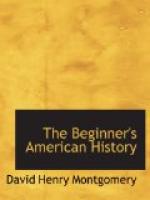One morning just after he had bought a new suit of clothes he started to drive to the court-house, a number of miles distant. On the way he saw a pig that was making desperate efforts to climb out of a deep mud-hole. The creature would get part way up the slippery bank, and then slide back again over his head in mire and water. Lincoln said to himself: I suppose that I ought to get out and help that pig; for if he’s left there, he’ll smother in the mud. Then he gave a look at his glossy new clothes. He felt that he really couldn’t afford to spoil them for the sake of any pig, so he whipped up his horse and drove on. But the pig was in his mind, and he could think of nothing else. After he had gone about two miles, he said to himself, I’ve no right to leave that poor creature there to die in the mud, and what is more, I won’t leave him. Turning his horse, he drove back to the spot. He got out and carried half a dozen fence-rails to the edge of the hole, and placed them so that he could get to it without falling in himself. Then, kneeling down, he bent over, seized the pig firmly by the fore legs and drew him up on to the solid ground, where he was safe. The pig grunted out his best thanks, and Lincoln, plastered with mud, but with a light heart, drove on to the court-house.
[Illustration: LINCOLN AND THE PIG.]
257. Lincoln is elected to the state legislature; he goes to Springfield to live; he is elected to Congress.—Many people in Illinois thought that they would like to see such a man in the state legislature[12] helping to make their laws. They elected him; and as he was too poor at that time to pay so much horse-hire, he walked from New Salem, a distance of over a hundred miles, to Vandalia,[13] which was then the capital of the state.
Lincoln was elected to the legislature many times; later, he moved to Springfield, Illinois, and made that place his home for the rest of his life.
The next time the people elected him to office, they sent him to Congress to help make laws, not for his state only, but for the whole country. He had got a long way up since the time when he worked with John Hanks[14] fencing the cornfield round his father’s cabin; but he was going higher still,—he was going to the top.
[Footnote 12: Legislature: persons chosen by the people of a state or country to make its laws.]
[Footnote 13: Vandalia (Van-da’li-a).]
[Footnote 14: John Hanks: see paragraph 250.]
258. The meeting for choosing a candidate[15] for President of the United States; the two fence-rails; the Chicago meeting; Abraham Lincoln elected President of the United States.—In the spring of 1860 a great convention, or meeting, was held in one of the towns of Illinois. Lincoln was present at that convention. The object of the people who had gathered there was to choose a candidate that they would like to see elected President of the United States. A number of speeches had been made, when a member of the convention rose and said that a person asked the privilege of making the meeting a present. It was voted to receive it. Then John Hanks and one of his neighbors brought in two old fence-rails and a banner with these words painted on it:—




